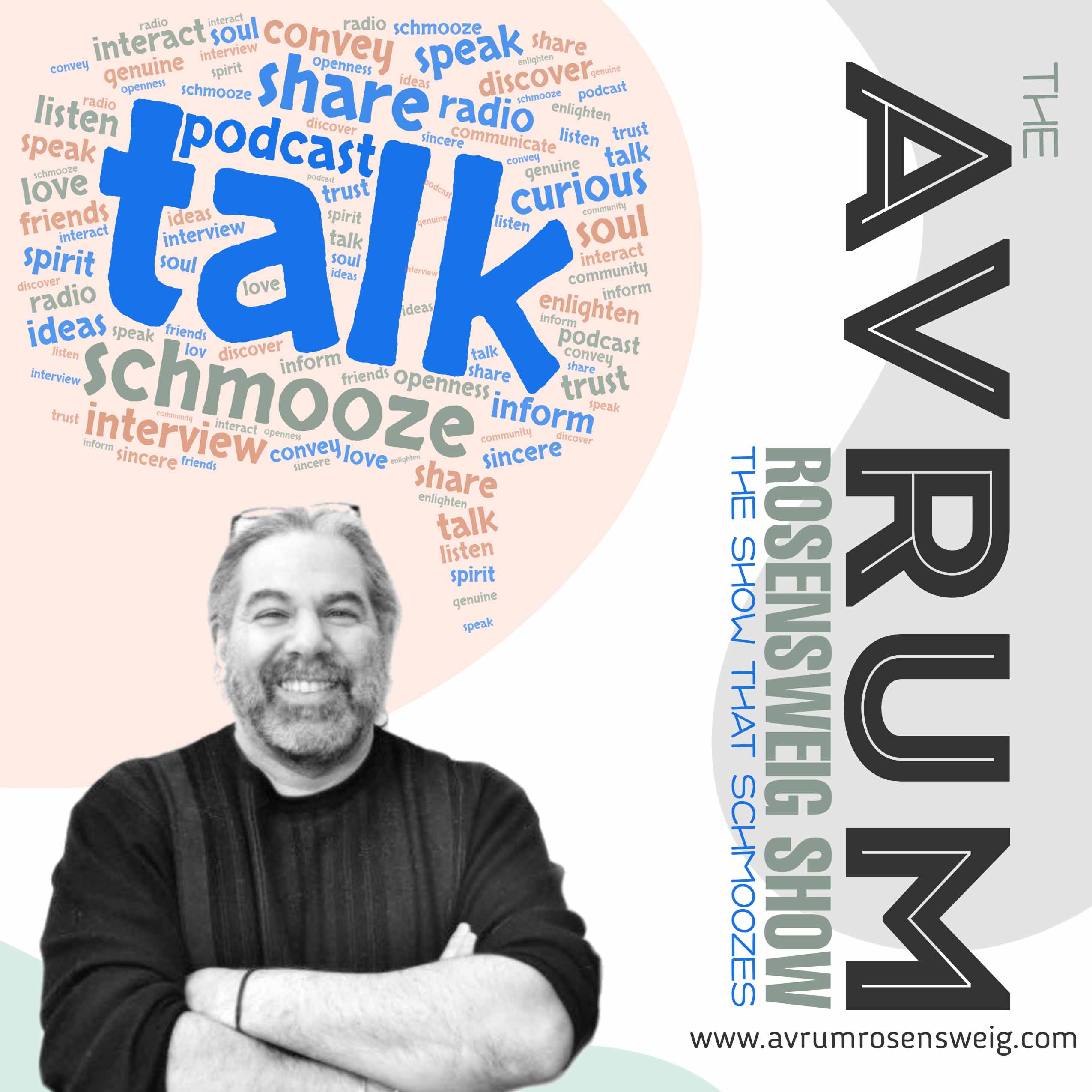
32.4K
Downloads
485
Episodes
The Avrum Rosensweig Show is a unique and intimate schmooze-fest with celebrity host, Avrum Rosensweig, who draws out secrets, dreams and inner most thoughts of plumbers, food servers, crossing guards, stars, celebrities and more. Nowadays, since the October 7th terrorist attack on southern Israel, Avrum is concentrating on Israel, and individuals who have a story to tell of courage and bravery about the days of the war.
Episodes
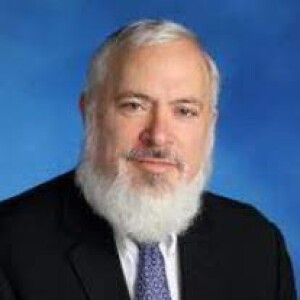
Thursday Jul 03, 2025
PARSHA & PROSE: PARSHAT CHUKAT & THE DEATH OF SIBLINGS (Audio)
Thursday Jul 03, 2025
Thursday Jul 03, 2025
In this episode of Parsha & Prose, Rabbi Shlomo Gemara and I explore the Torah portion of Chukat, focusing on the red heifer, a ch'ok—a divine statute beyond human understanding. We delve into the meaning behind this enigmatic commandment and why God gives us laws that defy comprehension. Additionally, we discuss the emotional weight of losing a sibling, as seen in the passing of Miriam and Aaron, Moses' sister and brother. Could Moses' act of striking the rock—against God's command to speak to it—stem from his overwhelming grief? We invite your questions and reflections on this parsha or any others we explore. Thank you for joining us—we’re deeply grateful. Am Yisrael Chai! Proud to be a Jew! ✡️ Why This Matters ✅Spiritual Depth: Uncovering the significance of Torah commandments we may never fully understand. ✅Emotional Truth: Seeing Moses not just as a leader, but as a brother, human, and mourner. ✅Timeless Teachings: Connecting ancient stories of loss and faith to modern experiences of grief and resilience. 💬 Join the Conversation: What part of this episode resonated with you the most? Drop a comment below — we’d love to hear your thoughts. 🎥 Explore More Episodes: ✅ PARSHA & PROSE: TORAH PORTION KORACH THROUGH THE LENS OF WORLD HISTORY: ![]() • PARSHA & PROSE: TORAH PORTION KORACH THROU... ✅ PARSHA & PROSE: THE SPIES IN SHELACH & ELI COHEN IN DAMASCUS:
• PARSHA & PROSE: TORAH PORTION KORACH THROU... ✅ PARSHA & PROSE: THE SPIES IN SHELACH & ELI COHEN IN DAMASCUS: ![]() • PARSHA & PROSE: THE SPIES IN SHELACH & ELI... ✅ PARSHA & PROSE WITH RABBI SHLOMO GEMARA, ON BEHALOTCHA:
• PARSHA & PROSE: THE SPIES IN SHELACH & ELI... ✅ PARSHA & PROSE WITH RABBI SHLOMO GEMARA, ON BEHALOTCHA: ![]() • PARSHA & PROSE WITH RABBI SHLOMO GEMARA, ... ——🎧 The Avrum Rosensweig Show —— A one-of-a-kind, intimate schmooze-fest, hosted and produced by the endlessly curious veteran radio and TV personality, Avrum Rosensweig. With warmth and wit, Avrum uncovers the secrets, dreams, and inner most thoughts of people from all walks of life. From local shelf stockers, plumbers, food servers to crossing guards, stars,public figures, and cultural icons. Join this channel to get access to perks:
• PARSHA & PROSE WITH RABBI SHLOMO GEMARA, ... ——🎧 The Avrum Rosensweig Show —— A one-of-a-kind, intimate schmooze-fest, hosted and produced by the endlessly curious veteran radio and TV personality, Avrum Rosensweig. With warmth and wit, Avrum uncovers the secrets, dreams, and inner most thoughts of people from all walks of life. From local shelf stockers, plumbers, food servers to crossing guards, stars,public figures, and cultural icons. Join this channel to get access to perks: ![]() / @avrumrosensweigshow Instagram:
/ @avrumrosensweigshow Instagram:  / theavrumrosensweigshow TikTok:
/ theavrumrosensweigshow TikTok:  / avrumrosensweig #jewish #jewishlearning #jewisheducation #jewishheritage #jewishtradition #israelites #talmudscholar #torahstudy #rabbishlomogemara #jewishwisdom #jewishculture #jewishcommunity #jewishhistory #jewishidentity #jewishphilosophy #spiritualwisdom #motivationalpodcast #motivationalinterview #inspiringstories #jewishleader #fascinatingpeople #engagingconversations #personalgrowth #lifelessons #leadershipstories #faithandwisdom #jewishinspirations #successstories #podcastinterview #theavrumrosensweigshow
/ avrumrosensweig #jewish #jewishlearning #jewisheducation #jewishheritage #jewishtradition #israelites #talmudscholar #torahstudy #rabbishlomogemara #jewishwisdom #jewishculture #jewishcommunity #jewishhistory #jewishidentity #jewishphilosophy #spiritualwisdom #motivationalpodcast #motivationalinterview #inspiringstories #jewishleader #fascinatingpeople #engagingconversations #personalgrowth #lifelessons #leadershipstories #faithandwisdom #jewishinspirations #successstories #podcastinterview #theavrumrosensweigshow
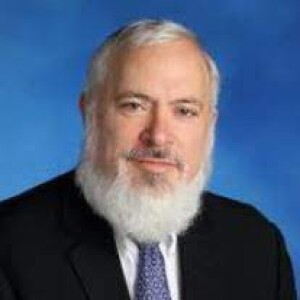
Thursday Jul 03, 2025
PARSHA & PROSE: PARSHAT CHUKAT & THE DEATH OF SIBLINGS (Audio/Visual)
Thursday Jul 03, 2025
Thursday Jul 03, 2025
In this episode of Parsha & Prose, Rabbi Shlomo Gemara and I explore the Torah portion of Chukat, focusing on the red heifer, a ch'ok—a divine statute beyond human understanding. We delve into the meaning behind this enigmatic commandment and why God gives us laws that defy comprehension. Additionally, we discuss the emotional weight of losing a sibling, as seen in the passing of Miriam and Aaron, Moses' sister and brother. Could Moses' act of striking the rock—against God's command to speak to it—stem from his overwhelming grief? We invite your questions and reflections on this parsha or any others we explore. Thank you for joining us—we’re deeply grateful. Am Yisrael Chai! Proud to be a Jew! ✡️ Why This Matters ✅Spiritual Depth: Uncovering the significance of Torah commandments we may never fully understand. ✅Emotional Truth: Seeing Moses not just as a leader, but as a brother, human, and mourner. ✅Timeless Teachings: Connecting ancient stories of loss and faith to modern experiences of grief and resilience. 💬 Join the Conversation: What part of this episode resonated with you the most? Drop a comment below — we’d love to hear your thoughts. 🎥 Explore More Episodes: ✅ PARSHA & PROSE: TORAH PORTION KORACH THROUGH THE LENS OF WORLD HISTORY: ![]() • PARSHA & PROSE: TORAH PORTION KORACH THROU... ✅ PARSHA & PROSE: THE SPIES IN SHELACH & ELI COHEN IN DAMASCUS:
• PARSHA & PROSE: TORAH PORTION KORACH THROU... ✅ PARSHA & PROSE: THE SPIES IN SHELACH & ELI COHEN IN DAMASCUS: ![]() • PARSHA & PROSE: THE SPIES IN SHELACH & ELI... ✅ PARSHA & PROSE WITH RABBI SHLOMO GEMARA, ON BEHALOTCHA:
• PARSHA & PROSE: THE SPIES IN SHELACH & ELI... ✅ PARSHA & PROSE WITH RABBI SHLOMO GEMARA, ON BEHALOTCHA: ![]() • PARSHA & PROSE WITH RABBI SHLOMO GEMARA, ... ——🎧 The Avrum Rosensweig Show —— A one-of-a-kind, intimate schmooze-fest, hosted and produced by the endlessly curious veteran radio and TV personality, Avrum Rosensweig. With warmth and wit, Avrum uncovers the secrets, dreams, and inner most thoughts of people from all walks of life. From local shelf stockers, plumbers, food servers to crossing guards, stars,public figures, and cultural icons. Join this channel to get access to perks:
• PARSHA & PROSE WITH RABBI SHLOMO GEMARA, ... ——🎧 The Avrum Rosensweig Show —— A one-of-a-kind, intimate schmooze-fest, hosted and produced by the endlessly curious veteran radio and TV personality, Avrum Rosensweig. With warmth and wit, Avrum uncovers the secrets, dreams, and inner most thoughts of people from all walks of life. From local shelf stockers, plumbers, food servers to crossing guards, stars,public figures, and cultural icons. Join this channel to get access to perks: ![]() / @avrumrosensweigshow Instagram:
/ @avrumrosensweigshow Instagram:  / theavrumrosensweigshow TikTok:
/ theavrumrosensweigshow TikTok:  / avrumrosensweig #jewish #jewishlearning #jewisheducation #jewishheritage #jewishtradition #israelites #talmudscholar #torahstudy #rabbishlomogemara #jewishwisdom #jewishculture #jewishcommunity #jewishhistory #jewishidentity #jewishphilosophy #spiritualwisdom #motivationalpodcast #motivationalinterview #inspiringstories #jewishleader #fascinatingpeople #engagingconversations #personalgrowth #lifelessons #leadershipstories #faithandwisdom #jewishinspirations #successstories #podcastinterview #theavrumrosensweigshow
/ avrumrosensweig #jewish #jewishlearning #jewisheducation #jewishheritage #jewishtradition #israelites #talmudscholar #torahstudy #rabbishlomogemara #jewishwisdom #jewishculture #jewishcommunity #jewishhistory #jewishidentity #jewishphilosophy #spiritualwisdom #motivationalpodcast #motivationalinterview #inspiringstories #jewishleader #fascinatingpeople #engagingconversations #personalgrowth #lifelessons #leadershipstories #faithandwisdom #jewishinspirations #successstories #podcastinterview #theavrumrosensweigshow
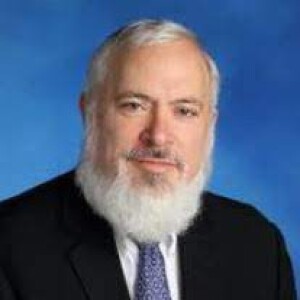
Friday Jun 27, 2025
Friday Jun 27, 2025
In this poignant episode of Parsha & Prose, Rabbi Shlomo Gemara and Avrum reflect on the tragic loss of seven IDF soldiers in Gaza this week. Rabbi Gemara shares a deeply personal connection, drawing from his experiences in the Lebanon War, where he lost friends in a tank attack. He reflects on the weight of their final moments and the enduring impact of such losses. 💠 The conversation also explores the life of an educator after the school year ends, delving into the roles and responsibilities of teachers and administrators once students leave. 💠 KORACH: Additionally, Rabbi Gemara and Avrum analyze Korach’s rebellion against Moshe and Aaron, questioning the validity of his challenge and its underlying motivations. The discussion broadens to examine historical failed coups, exploring their causes and consequences, drawing parallels to Korach’s actions. The episode concludes with a heartfelt affirmation: Am Yisrael Chai!—a proud declaration of Jewish resilience and identity. 🎬 WATCH MORE EPISODES ✅ ETHAN DAVIDSON ON HIS FATHER BRINGING HOME GREAT NBA PLAYERS, ISAIAH THOMAS AND BOB LANIER 👉 This Video Link: ![]() • ETHAN DAVIDSON ON HIS FATHER BRINGING HOME... ✅ A JEWISH WARRIOR'S LIFE: ITZCHAK LEVIT ON ISRAEL, IRAN & FAITH 👉 This Video Link:
• ETHAN DAVIDSON ON HIS FATHER BRINGING HOME... ✅ A JEWISH WARRIOR'S LIFE: ITZCHAK LEVIT ON ISRAEL, IRAN & FAITH 👉 This Video Link: ![]() • A JEWISH WARRIOR'S LIFE: ITZCHAK LEVIT ON ... ✅ PARSHA & PROSE: THE SPIES IN SHELACH & ELI COHEN IN DAMASCUS 👉This Video Link:
• A JEWISH WARRIOR'S LIFE: ITZCHAK LEVIT ON ... ✅ PARSHA & PROSE: THE SPIES IN SHELACH & ELI COHEN IN DAMASCUS 👉This Video Link: ![]() • PARSHA & PROSE: THE SPIES IN SHELACH & ELI... ✅ AUTHOR SARAH LANDENWICH TALKS ABOUT HER FIRST BOOK, 'THE FIRE CONCERTO' 👉This Video Link:
• PARSHA & PROSE: THE SPIES IN SHELACH & ELI... ✅ AUTHOR SARAH LANDENWICH TALKS ABOUT HER FIRST BOOK, 'THE FIRE CONCERTO' 👉This Video Link: ![]() • AUTHOR SARAH LANDENWICH TALKS ABOUT HER FI... ✅ PARSHA & PROSE WITH RABBI SHLOMO GEMARA, ON BEHALOTCHA 👉 This Video Link:
• AUTHOR SARAH LANDENWICH TALKS ABOUT HER FI... ✅ PARSHA & PROSE WITH RABBI SHLOMO GEMARA, ON BEHALOTCHA 👉 This Video Link: ![]() • PARSHA & PROSE WITH RABBI SHLOMO GEMARA, ... ✅ THE TEACHER OF AUSCHWITZ: A NOVEL ABOUT THE HEROIC FREDY HIRSCH 👉 This Video Link:
• PARSHA & PROSE WITH RABBI SHLOMO GEMARA, ... ✅ THE TEACHER OF AUSCHWITZ: A NOVEL ABOUT THE HEROIC FREDY HIRSCH 👉 This Video Link: ![]() • THE TEACHER OF AUSCHWITZ: A NOVEL ABOUT TH... 🌟 LET'S STAY CONNECTED...👇 🧡 https://www.avrumrosensweig.com
• THE TEACHER OF AUSCHWITZ: A NOVEL ABOUT TH... 🌟 LET'S STAY CONNECTED...👇 🧡 https://www.avrumrosensweig.com
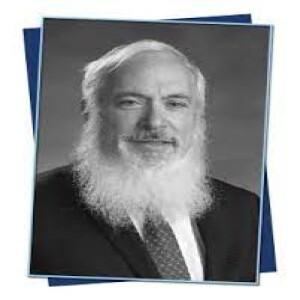
Friday Jun 27, 2025
Friday Jun 27, 2025
In this poignant episode of Parsha & Prose, Rabbi Shlomo Gemara and Avrum reflect on the tragic loss of seven IDF soldiers in Gaza this week. Rabbi Gemara shares a deeply personal connection, drawing from his experiences in the Lebanon War, where he lost friends in a tank attack. He reflects on the weight of their final moments and the enduring impact of such losses. 💠 The conversation also explores the life of an educator after the school year ends, delving into the roles and responsibilities of teachers and administrators once students leave. 💠 KORACH: Additionally, Rabbi Gemara and Avrum analyze Korach’s rebellion against Moshe and Aaron, questioning the validity of his challenge and its underlying motivations. The discussion broadens to examine historical failed coups, exploring their causes and consequences, drawing parallels to Korach’s actions. The episode concludes with a heartfelt affirmation: Am Yisrael Chai!—a proud declaration of Jewish resilience and identity. 🎬 WATCH MORE EPISODES ✅ ETHAN DAVIDSON ON HIS FATHER BRINGING HOME GREAT NBA PLAYERS, ISAIAH THOMAS AND BOB LANIER 👉 This Video Link: ![]() • ETHAN DAVIDSON ON HIS FATHER BRINGING HOME... ✅ A JEWISH WARRIOR'S LIFE: ITZCHAK LEVIT ON ISRAEL, IRAN & FAITH 👉 This Video Link:
• ETHAN DAVIDSON ON HIS FATHER BRINGING HOME... ✅ A JEWISH WARRIOR'S LIFE: ITZCHAK LEVIT ON ISRAEL, IRAN & FAITH 👉 This Video Link: ![]() • A JEWISH WARRIOR'S LIFE: ITZCHAK LEVIT ON ... ✅ PARSHA & PROSE: THE SPIES IN SHELACH & ELI COHEN IN DAMASCUS 👉This Video Link:
• A JEWISH WARRIOR'S LIFE: ITZCHAK LEVIT ON ... ✅ PARSHA & PROSE: THE SPIES IN SHELACH & ELI COHEN IN DAMASCUS 👉This Video Link: ![]() • PARSHA & PROSE: THE SPIES IN SHELACH & ELI... ✅ AUTHOR SARAH LANDENWICH TALKS ABOUT HER FIRST BOOK, 'THE FIRE CONCERTO' 👉This Video Link:
• PARSHA & PROSE: THE SPIES IN SHELACH & ELI... ✅ AUTHOR SARAH LANDENWICH TALKS ABOUT HER FIRST BOOK, 'THE FIRE CONCERTO' 👉This Video Link: ![]() • AUTHOR SARAH LANDENWICH TALKS ABOUT HER FI... ✅ PARSHA & PROSE WITH RABBI SHLOMO GEMARA, ON BEHALOTCHA 👉 This Video Link:
• AUTHOR SARAH LANDENWICH TALKS ABOUT HER FI... ✅ PARSHA & PROSE WITH RABBI SHLOMO GEMARA, ON BEHALOTCHA 👉 This Video Link: ![]() • PARSHA & PROSE WITH RABBI SHLOMO GEMARA, ... ✅ THE TEACHER OF AUSCHWITZ: A NOVEL ABOUT THE HEROIC FREDY HIRSCH 👉 This Video Link:
• PARSHA & PROSE WITH RABBI SHLOMO GEMARA, ... ✅ THE TEACHER OF AUSCHWITZ: A NOVEL ABOUT THE HEROIC FREDY HIRSCH 👉 This Video Link: ![]() • THE TEACHER OF AUSCHWITZ: A NOVEL ABOUT TH... 🌟 LET'S STAY CONNECTED...👇 🧡 https://www.avrumrosensweig.com
• THE TEACHER OF AUSCHWITZ: A NOVEL ABOUT TH... 🌟 LET'S STAY CONNECTED...👇 🧡 https://www.avrumrosensweig.com
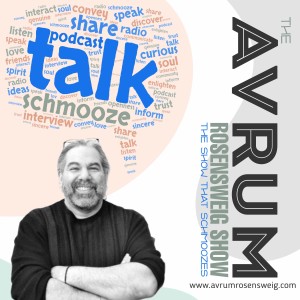
Friday Jun 20, 2025
A JEWISH WARRIOR'S LIFE: ITZCHAK LEVIT ON ISRAEL, IRAN & FAITH (Audio)
Friday Jun 20, 2025
Friday Jun 20, 2025
Welcome to this episode, where I'm honored to sit down with Itzchak Levit, a former officer in the Israel Defense Forces (IDF), and chairperson of the Givati Brigade Association. He is a man of profound insight and experience. In this compelling conversation, Itzchak opens up about Israel’s complex and ongoing conflict with Iran, offering a rare glimpse into the strategic brilliance of the Mossad and the IAF, and the remarkable creativity that defines Jewish and Israeli resilience in wartime. With unwavering passion, he shares his deep love, appreciation, and faith in the Jewish people, reflecting on their enduring strength and unity. Adding a personal touch, Itzchak also speaks warmly about his 44-year marriage, revealing the heart behind the hero. Join us for an inspiring and thought-provoking discussion that bridges history, strategy, and humanity.

Friday Jun 20, 2025
Friday Jun 20, 2025
Welcome to this episode, where I'm honored to sit down with Itzchak Levit, a former officer in the Israel Defense Forces (IDF), and chairperson of the Givati Brigade Association. He is a man of profound insight and experience. In this compelling conversation, Itzchak opens up about Israel’s complex and ongoing conflict with Iran, offering a rare glimpse into the strategic brilliance of the Mossad and the IAF, and the remarkable creativity that defines Jewish and Israeli resilience in wartime. With unwavering passion, he shares his deep love, appreciation, and faith in the Jewish people, reflecting on their enduring strength and unity. Adding a personal touch, Itzchak also speaks warmly about his 44-year marriage, revealing the heart behind the hero. Join us for an inspiring and thought-provoking discussion that bridges history, strategy, and humanity.

Sunday Jun 15, 2025
Sunday Jun 15, 2025
In this episode, I’m thrilled to schmooze with Sarah Landenwich, author of the gripping new novel 'The Fire Concerto'. This literary page-turner follows a brilliant female musician lost to history and another woman’s quest to ensure her legacy endures. Packed with tension, surprises, and vivid portrayals of the brutal realities faced by exceptionally talented women in the 19th century, the book is a tribute to forgotten female musicians, artists, and intellectuals—many of whom Sarah, a classically trained pianist, named her characters after. Hailing from Louisville, Kentucky, where she lives with her husband and daughter, Sarah brings her love of Romantic-period music to this mesmerizing debut. Lauren Belfeer, New York Times bestselling author of And After the Fire and Ashton Hall, calls it “a mesmerizing story of passion, suspense, and heartbreak” that lingers long after the final page. So, grab a seat, and let’s explore the music, history, and heart behind The Fire Concerto with Sarah Landenwich!

Sunday Jun 15, 2025
Sunday Jun 15, 2025
In this episode, I’m thrilled to schmooze with Sarah Landenwich, author of the gripping new novel 'The Fire Concerto'. This literary page-turner follows a brilliant female musician lost to history and another woman’s quest to ensure her legacy endures. Packed with tension, surprises, and vivid portrayals of the brutal realities faced by exceptionally talented women in the 19th century, the book is a tribute to forgotten female musicians, artists, and intellectuals—many of whom Sarah, a classically trained pianist, named her characters after. Hailing from Louisville, Kentucky, where she lives with her husband and daughter, Sarah brings her love of Romantic-period music to this mesmerizing debut. Lauren Belfeer, New York Times bestselling author of And After the Fire and Ashton Hall, calls it “a mesmerizing story of passion, suspense, and heartbreak” that lingers long after the final page. So, grab a seat, and let’s explore the music, history, and heart behind The Fire Concerto with Sarah Landenwich!

Friday Jun 13, 2025
PARSHA & PROSE WITH RABBI SHLOMO GEMARA, ON BEHALOTCHA (Audio)
Friday Jun 13, 2025
Friday Jun 13, 2025
Join me on Parsha and Prose for a dynamic conversation with Rabbi Shlomo Gemara, as we explore vital issues facing the Jewish people, Israel, and our community through the lens of Torah and literature. In this episode, we dive into the Torah portion Behalotcha, discussing the Haredi community’s role in the Israel Defense Forces, with Rabbi Gemara emphasizing the unity of all Jews in defending our people during challenging times. We also reflect on important issues within the parsha including: Miriam and Aaron’s lashon hara (gossip) against Moshe\;, exploring how guarding our speech fosters moral integrity. Rabbi Gemara illuminates the menorah as a symbol of Jewish light, alongside the trumpet and manna, weaving a tapestry of spiritual resilience and meaning. This action-packed episode is a call to pride and purpose—Am Yisrael Chai! Subscribe, comment, and join us in celebrating Jewish wisdom and our beautiful peoplehood.
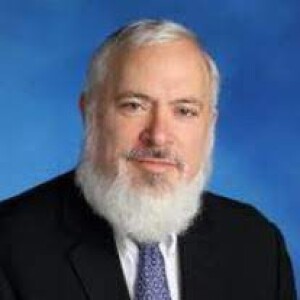
Friday Jun 13, 2025
PARSHA & PROSE WITH RABBI SHLOMO GEMARA, ON BEHALOTCHA (Audio/Visual)
Friday Jun 13, 2025
Friday Jun 13, 2025
Join me on Parsha and Prose for a dynamic conversation with Rabbi Shlomo Gemara, as we explore vital issues facing the Jewish people, Israel, and our community through the lens of Torah and literature. In this episode, we dive into the Torah portion Behalotcha, discussing the Haredi community’s role in the Israel Defense Forces, with Rabbi Gemara emphasizing the unity of all Jews in defending our people during challenging times. We also reflect on important issues within the parsha including: Miriam and Aaron’s lashon hara (gossip) against Moshe\;, exploring how guarding our speech fosters moral integrity. Rabbi Gemara illuminates the menorah as a symbol of Jewish light, alongside the trumpet and manna, weaving a tapestry of spiritual resilience and meaning. This action-packed episode is a call to pride and purpose—Am Yisrael Chai! Subscribe, comment, and join us in celebrating Jewish wisdom and our beautiful peoplehood.
